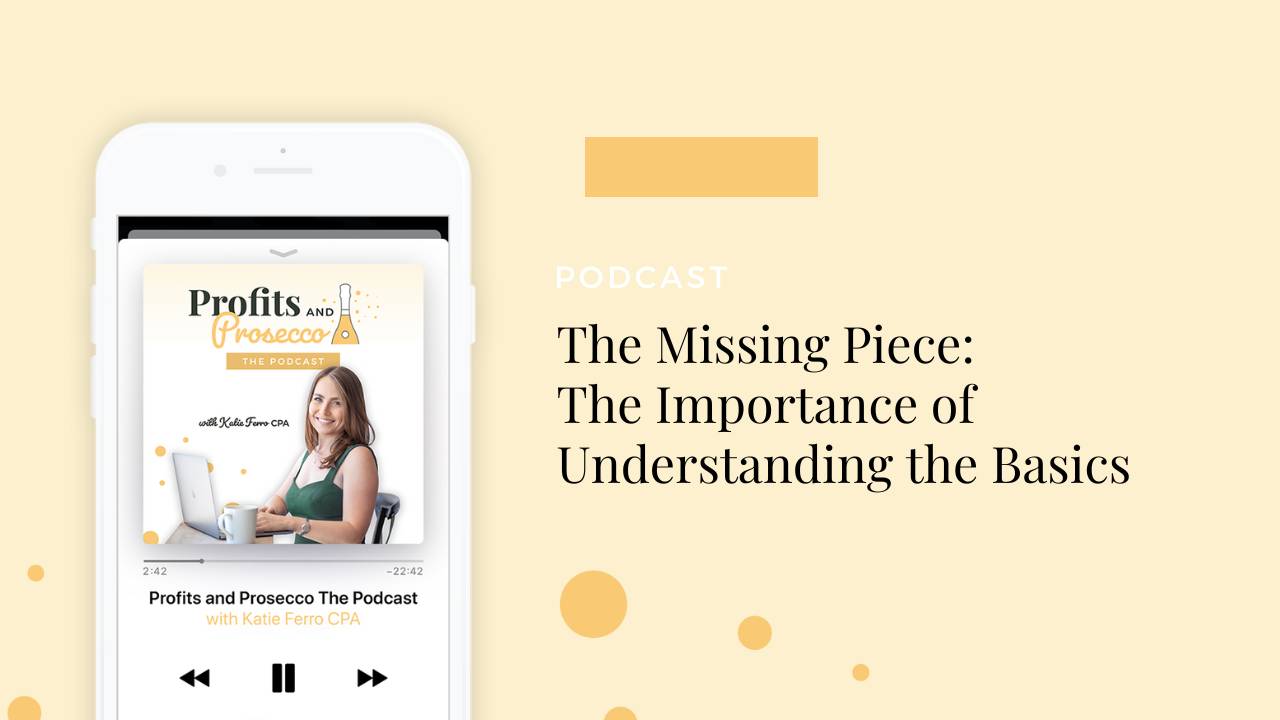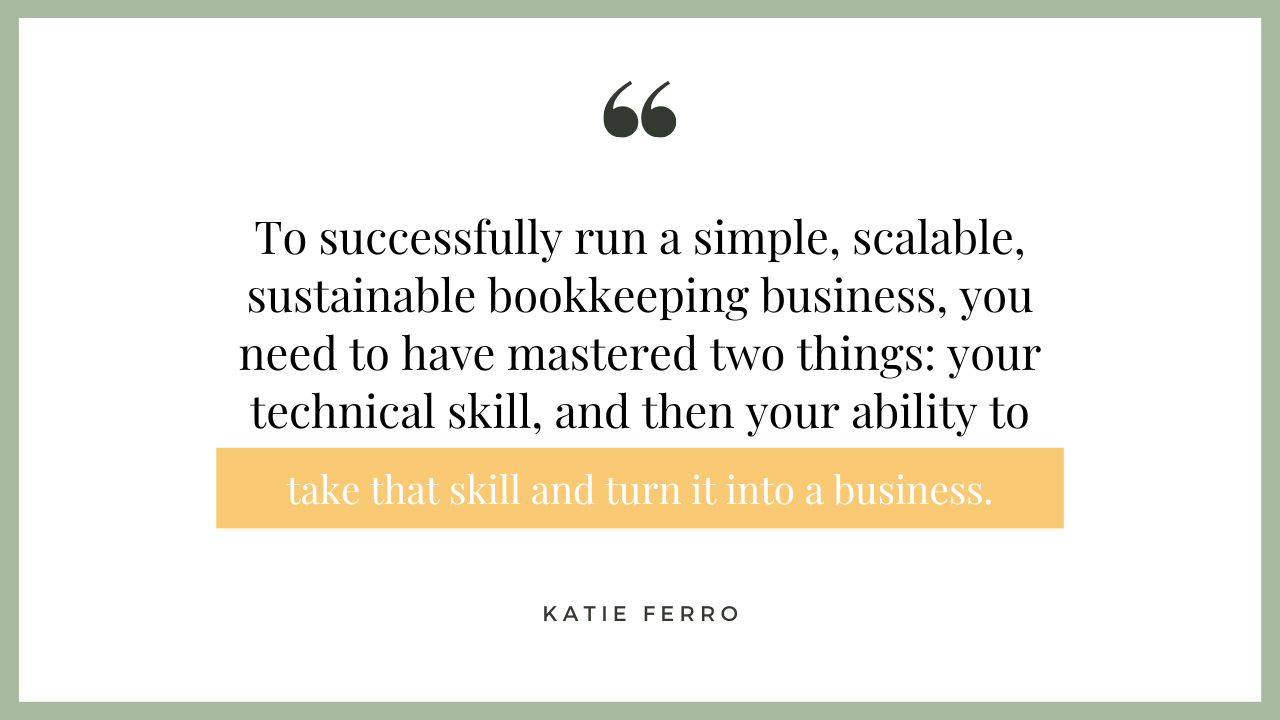The Missing Piece Part I: What You Need to Know Before You Become a Bookkeeper
Apr 17, 2023
Welcome to Part I of my mini-series The Missing Piece, where I’ll be talking all about what happens if you’re missing any of the core basics of bookkeeping.
Lately, I’ve been focusing a lot on my program Become a Bookkeeper, which is a self-paced program that teaches the technical skill of bookkeeping.
Become a Bookkeeper walks you through three phases—Learn, Shadow, and Apply—and what I'm going to do in this three-part mini-series is break down what happens if you are missing core understanding from any of those phases.
Become a Bookkeeper: The LEARN Section
For today, we’re going to start with the “Learn” section of Become a Bookkeeper.
The best way to grow a simple, sustainable, ethical business that allows you to actually have your time back is to be good at what you do. So within Learn, there are three things that I think you need to know—what I call the basics of bookkeeping, though my version of the “basics” is pretty robust.
In Learn, you’ll learn three different things: the basics of accounting, the basics of bookkeeping, and the basics of tax.
Accounting
First up is learning the basics of accounting.
When I was setting up Become a Bookkeeper, I thought, “Who better to teach accounting than the textbooks?”
Let’s be honest: the teaching of accounting has already been done. I don't want to mess with it; if it ain’t broke, don’t fix it, right?
So for learning the basics of accounting, we walk through a textbook that I sourced that tells you the real depth of accounting; however, this is for simpler businesses, not complex ones.
You're not going to walk away from Become a Bookkeeper with an accounting degree, but you are going to walk away with the most important things that you need to know about accounting, because without understanding accounting, you won't understand the next piece, which is bookkeeping.
Accounting is a beautiful system. I adore the system of accounting. I wish that there were more systems like it, where everything just has to balance to zero. There's a double-sided nature of every single transaction, and that's what's covered in accounting.
Not only do you go through this textbook that teaches the foundations of accounting, but I then will explain to you how that relates to bookkeeping, which is a different thing.
Bookkeeping is something that is often glossed over, even if you already have a degree in accounting. So I’m careful to connect the two and put the most important pieces into your brain so that you understand, because with bookkeeping it tends to gets oversimplified a ton.
If you don't understand the basics of accounting before you become a bookkeeper, you will probably key something in wrong and not even know you're doing it. And this is a big problem, because…who's checking your work? When is that error going to get discovered? Will the client’s CPA discover it? Is it going to go undiscovered entirely? Will it be the IRS?
If the CPA discovers it, will you lose the client? Will they tell their friends, who they referred to you, that you made a mistake, and then you end up losing multiple clients at once? Do you lose trust in yourself to the point that you call it quits on the whole business? Do you lose sleep at night because you are afraid of what you might be missing?
These are some things that can happen when you become a bookkeeper without understanding the simple basics of accounting.
Bookkeeping
Like I said, bookkeeping is not only oversimplified a lot, but it's also something that is not heavily taught almost anywhere. It wasn't heavily taught in either of my degrees in accounting. I have a undergrad in accounting and a master's in tax, and we didn't talk about bookkeeping in either one. I didn't touch QuickBooks or anything like that. And yes, it was over a decade ago, so the systems have changed a bit, and I’m glad I wasn’t taught on archaic bookkeeping software; but still, we didn't learn bookkeeping because they wanted to teach much more complicated accounting things than what you learn inside of Become a Bookkeeper.
I believe that the intro to accounting that you get in Become a Bookkeeper is actually the only one that ties into bookkeeping. And if you're missing that understanding when you become a bookkeeper, then it's very hard to translate the connection between accounting and bookkeeping to your clients, and then you are missing an opportunity to understand what's happening enough to explain it to them.
So then we move into understanding the basics of bookkeeping, because again, you're not going to learn it in college. You may learn it on the job, but even if you do, it's probably not going to be the greatest bookkeeping.
Inside of Become a Bookkeeper, you're going to be looking at modern businesses and the modern way of taking that information and putting it into the books so that you are using the up-to-date softwares to make the process more efficient.
We’re going to go over what that process looks like before we go into the next phase, which is Shadow, and before you roll up your sleeves in Apply. Before we get to those phases, I want you to know what you're about to get into so that when you watch through those next phases, it makes more sense.
You're able to look at it and say, “Okay. I know that before I take a client, I need to ask these questions. I know when I onboard a client, I need to go through these steps. Then on a monthly basis, I'm going to be doing these few things, and here's my check figure, and then I'm going to send them these reports, and that's the whole picture.”
All of that can be confusing and overwhelming if you become a bookkeeper without having that basic explanation of what the process even is, so that's a really great thing to walk you through before we hit the Shadow section.
There are a couple of other things that can make a big impact on the way that you're feeling about your business and the way that your business is actually running if you miss them before you become a bookkeeper; for instance, if you're missing questions, if you don't know what your start date should be for books, if you don't know what things to look for in existing books or how to start books from scratch, it gets overwhelming.
What I focus on in my practice is making the whole thing really simple. I try to talk to my clients as little as possible, both for me and for them, because to be honest, nobody wants to talk about bookkeeping that often. They want a system that eliminates questions, and then they want you to have your shit together enough to know what questions to ask.
We also go over how to ask questions when you do actually need to get certain information from them, and what that information will be. Knowing why you need it is going to help you obtain it, so having those pieces in place is really going to help you moving forward.
If you're missing the core understanding of accounting and bookkeeping, as you're taking on clients, you’re going to get very overwhelmed by looking at the software and trying to navigate through it. You won’t know where to go for what you need or even where to look for it.

Tax
The third thing that we talk about in the Learn section of Become a Bookkeeper is the basics of tax.
As a licensed CPA, I am passionate about tax, and it's a very delicate line to walk as a bookkeeper.
Now, as a bookkeeper, you should not be giving tax advice, giving tax answers, or doing taxes. However, that doesn't mean that you're going to be able to avoid taxes at all. You're going to have to talk about them. Your clients are going to ask you tax questions a lot, and you’re likely going to have to interface with their CPAs eventually, so you’ll want to have a working understanding in order to have a productive conversation.
The good news is that you don't have to be a full-blown expert in tax—in fact, please don't prepare taxes if you don't have a license. I know that you can, but I don't think that you should.
Bookkeeping is a great gig that is needed, but it's a support role to tax preparers, which means you're going to need to be well-versed on tax subjects so you know how to have a competent conversation with your client when they ask you basic tax questions. You want to be able to give them basic answers on deductions while still deferring that conversation to their CPA.
You're not going to walk away from Become a Bookkeeper as a tax preparer, but you will walk away feeling much more comfortable, knowing that you're going to get tax questions and knowing how to field them.
If a question is not for me—meaning if it's a tax question—I’m going to kick it out to their CPA, and you should too. But that doesn't mean that you should be totally ignorant to taxes.
So we break down what the basics are in Become a Bookkeeper; we talk about payroll tax, we talk about sales tax, and we talk about what questions to ask and who you should ask them of.
Beyond that, there are two ways to approach tax: one is to totally avoid it, and the other is to cross lines, and I think they're both dangerous. You’re much better off staying in your lane, but you should also be educating yourself on the other lane so you can work with the people over there to create the best outcome for your client.
It's important to have the tax conversation in a bookkeeping course. It's important to know what questions you're going to ask and to have a general understanding.
Now, you can deepen your knowledge if you want to, and if you have a strong interest in tax, that's awesome. We need more tax preparers. We need more competent ones. But if you want to do that kind of work, you need to go beyond a bookkeeping course.
This may be your first thread into it, and bookkeeping may be something that you do while you get the right credentials and the right experience to be an excellent tax preparer, but you shouldn’t be working as one after going through Become a Bookkeeper.

Close Those Knowledge Gaps!
These are a few of the ways that you can close those gaps in your knowledge. These are the things that should be known, and this is just the Learn section!
Stay tuned for the next sections on Shadow and Apply, how those sections fill more missing pieces, and how those gaps can affect your bookkeeping business.
WORK WITH KATIE:
If you're looking for more tips for bookkeeping, insight on how to become a bookkeeper, and how to say hello to a more confident business model, enroll in Become A Bookkeeper (BABs).
To learn about the programs and get a peek behind the curtain, head to www.katieferro.com/6-secrets.
Learn how to take your bookkeeping skills and turn them into a business that allows you to replace (or surpass) your corporate salary, be present for your life, and profoundly impact your clients without selling your life in the process by joining Life by the Books (LIBBY).
If you have enjoyed this post, head on over to Instagram, share your IG stories, and tag me: @orderlyaccountingbykatie
CONNECT WITH KATIE:
Website: https://www.katieferro.com/




